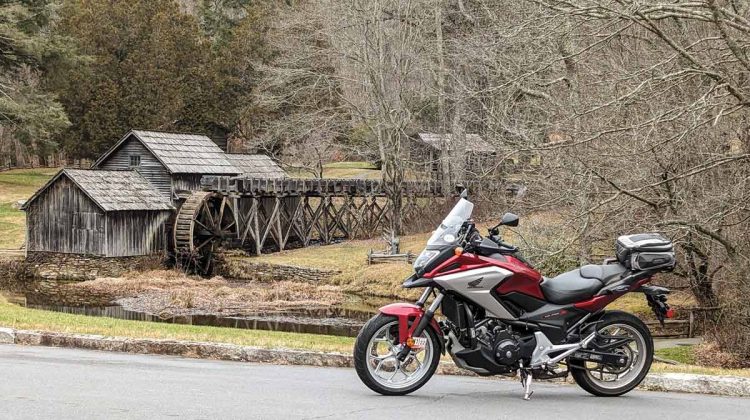
Floyd is just different.
You wouldn’t be able to tell from a Virginia map. Floyd looks much like any other small-town county seat in the southwest part of the state.
And you likely wouldn’t be able to tell on a quick drive-through, passing through the main intersection of State Route 8 and U.S. 221, the corner of Main and Locust, where you’ll find the county’s sole traffic light.
You may not be able to tell from a motorcycle ride through the countryside, where the faded political posters dot the small home driveways and cows amble peacefully in roadside fields.
Yet Floyd, tiny Floyd, is renowned as Virginia’s — heck, maybe America’s — premier hippie town. Which is reason enough to visit. Add to the mix a Bohemian retail scene spread throughout the county, with wineries, crafters, ziplines, galleries, distilleries, organic farms and markets, bakeries and even museums. There are mountains to hike to the top. And yes indeedy, a plethora of fabulous roads, both paved and unpaved, that provide exceptional motorcycling.
Geographically, Floyd County sits atop the Blue Ridge Escarpment, framed on its southeastern border by the Blue Ridge Parkway. Interestingly, when you ride from the southeast over any of the roads that ascend the escarpment from the Piedmont, you gain elevation rapidly, but when you crest to the top, you don’t go back down the other side. Instead, you enter a high-elevation plateau of small mountains, valleys, ridges and streams. Every drop of water that lands in Floyd County leaves it in one direction or another; no watercourses enter it.
Furthermore, there are no four-lane roads. The county is one of the few in Virginia that has never hosted a railroad. Its population crested at just over 15,000 back at the turn of the last century, dropped to 10,000 in 1970, and has crested back over 15,000 now. The town’s character has changed from its roots as a farming community to hosting artisans, musicians, writers and retirees.
On a cold winter day in December, I rode down to meet one of those retirees, Harley-Davidson rider Nick Piazza, to sample some local loops.
Because all good motorcycling routes seem to need a name these days, an organization called Jagged Edge has mapped out eight loops encompassing the escarpment area from the North Carolina border through Floyd and up to Roanoke. You can find these on their website at thejaggededge.weebly.com. They also produce a handy printed map of all eight. The loops range in distance from a mere eight miles to 47 miles, so you can do several in a day’s riding.
My favorite craft is stained glass making, and I’ve built several panels. Nick and I devised our own loop and called it the “Stained Glass Loop.” We headed east from Floyd and crested the ridge and the famed Blue Ridge Parkway on Shooting Creek Road, where many moonshine runs were made back during Prohibition, when daredevil drivers who would become NASCAR drivers attempted to outrun pursuing revenuers down its precipitous, winding and narrow drop.
This part of our ride from Floyd to Ferrum, including Shooting Creek Road, is part of The Crooked Road. Designated in 2004, The Crooked Road is Virginia’s heritage route exploring the musical history of the region from Rocky Mount, near Ferrum, through Floyd, and all the way to the western border of the state at Breaks Interstate Park, which (shameless plug) was the theme for my 2011 travelogue by motorcycle, “Harmonic Highways.”
We stopped at Ferrum College, a Methodist institution founded in 1913. Its signature edifice is the impressive Vaughan Chapel. It is a whimsically unique design, resembling the cross-shaped fairy stones, Staurolite crystals that are found in only a few places around the world, but notably just south of Ferrum at Fairy Stone State Park. Each of the chapel’s four main walls is draped in stained glass, which on sunny days shower the floor with color.
We headed back westward on fabulous Route 40, which should be named after some body part of a fictional reptilian creature from folklore, but it evidently hasn’t been discovered by outsiders yet. Still, the 17 miles of curves are among the favorites of every local rider, snaking along the base of the escarpment. Nick drove his massive Harley Road Glide faster than any motorcycle that huge should ever go, keeping pace with my smaller, nimbler Honda NC750X. The speed limit is 55, but don’t expect to average any more than that, given all the curves and impetuous deer lurking in the shadows.
Keeping to our theme, our next stop was at the Rose Window Studio in tiny Woolwine, population 729. Owner Amanda Honore Donley is a “Jill of all trades,” spending her time and prodigious talents on custom art and stained glass projects for area churches and residences, but also selling paintings and crafts both of her own design and making, and those of her friends. And of course, she sells me the glass supplies I use and drew for me the last panel I did, a rustic cabin in the woods.
“I’m originally from San Diego, but I’ve been here doing this for 40 years,” she said. “I feel part of the Floyd and Patrick county arts scene. Because of the natural beauty, the quiet, and the solitude, this area is conducive to being an artist.”
The beauty is everywhere you look. The pace of life is reflective. Donley said artists feel like they have the requisite time to spend in your own head, something creative people need.
“I have a studio where I make and repair stained glass. I do some teaching. I have a gallery with my work and the work of other artists, with different media. Most of my work is on commission, custom work for specific placement,” she said.
Business was good even during the pandemic since it’s rural area and people felt safe coming here.
“I made several nature-themed, stained-glass panels that were installed in a fabulous custom timber-frame home,” Donley said. “The owner told me that her favorite thing in her house was my strained glass. It made me feel really good!”
Nick and I turned northward and climbed back atop the escarpment on excellent Route 8 to Tuggle’s Gap, past the recently refurbished and reopened Tuggle’s Gap Roadside Inn. We stopped, hoping for a hot chocolate, but they were closed.
From there, we caught the parkway southbound to Rocky Knob with its unreal views of Buffalo Mountain to the west and the North Carolina Piedmont to the south, where the road crested above 3,000 feet and the temperature reading on my Honda’s dashboard thermometer plunged toward freezing.
We passed the entrance to the FloydFest site, where the region’s premier music and arts festival is held, past the Chateau Morrisette and Villa Appalachia wineries, and then past Mabry’s Mill, often called the most photographed location on the entire Blue Ridge Parkway. The store and restaurant are closed in winter, but it still makes for a nice place to stroll.
We interrupt this travelogue for a wee bit of history: As I mentioned, from its earliest days, Floyd was a farming community, largely populated by immigrants from Western Europe, principally Scotland, Ireland, England and Germany. In the 1970s, the days of “Country Roads,” “Foxfire” and “The Whole Earth Catalog,” young city dwellers began looking for simpler lifestyles and more rural environments. Land was cheap and folks started planting gardens and raising cows, sheep, goats, and chickens. People collected and processed herbs. Artists, woodworkers, and writers came, and musicians blended their talents with the locals. Surely there were some tensions, but overall folks got on well, with mutual appreciation for respective talents. Today’s Floyd is a congenial amalgam of these groups.
Arriving in Meadows of Dan, we called on Will Beers at his eponymous Willville Motorcycle Campground. He was also closed for the season, but he lives on-site, and we sat a spell to chat with us about the vision that became his campground.
“My guests come for the quiet, for the slower pace,” he said. “Somebody put a clock on a wall in town that said, ‘Meadows of Dan Time,’ that had no hands on it. Floyd time is an hour off, either way. That’s what you call a Floydian slip. There’s probably somebody in town named Sigmund Floyd.”
His comment reminded me that I’d once seen a pink T-shirt in a downtown store with a glass prism splitting a beam of light. Get it?
Floyd is different.
Beers opened the campground in 2000. He was working in retail but missed motorcycle people. He had seen some of the motorcycle camps in North Carolina in those days and thought he could replicate the model in Virginia.
“When I bought this land, it was fully forested. I had to clear everything and then build the structures you see today,” he said. “It’s a hobby. I work six months a year and take six months off. Even when I’m working, I can take rides during the week.”
Registration is all on the honor system. People check themselves in and leave the fee. Beers ran everything by himself for 15 years, but now has three full-time helpers during the season.
“My guests love it. Seventy-five percent are regulars. We’ve had people from all over the world,” Beers said. “It’s not for everybody. We’re not upscale. People sleep in tents. There are restaurants, groceries, and gas a mile away in the village.”
For the last dozen years, the Twin Valley Riders motorcycle club has held its annual rally at Willville Motorcycle Campground.
“My guests are getting older. The average age has always been higher than I expected, probably 60 years old. They don’t do this because they can’t afford to stay in a motel. They ride in on $20,000 motorcycles and sleep on the ground,” he said. “This is a destination. Few people arrive unexpectedly; their stays are planned. The parkway is on everyone’s list of great places to ride. Whether the economy is good or bad, you can always go camping.”
We backtracked into Floyd in time for lunch at the town’s primary attraction, the Floyd Country Store. Nationally, indeed internationally, famous, for the Friday Night Jamboree, during the rest of the week it’s a great hangout for good food, apparel, candy and ice cream. Opened in 1910, the store has served the county ever since, although the nature of the business has changed.
Originally it was called Farmer’s Supply and was a true general store until the late 1990s, staying open only one night per week for what is now the Friday Night Jamboree. In the 1980s, it was known as Cockram’s General Store, where locals came to play, share, and dance to music.
Nick and I sat in a tight booth by the front window, beside a fantastic holiday-themed gingerbread house. I watched folks come and go, wearing Carhartt jeans and tie-died hoodies, beads and scarves. There was nary a necktie to be seen.
I asked about his Floyd experience.
“I retired here after teaching psychology at the University of Toledo for 30 years. When I got close to retirement, my wife and I thought about places to retire. I wanted a place with either mountains or oceans. She was into the music scene here,” Nick said. “We found Floyd back in 2010 on a motorcycle ride down the parkway from Front Royal. We worked our way down and ended up spending a day in Floyd. It was a quirky town and we really enjoyed it. We started attending FloydFest.”
Nick also enjoys the fantastic motorcycling roads in Floyd County, which offers elevation changes from 800 feet to over 3,000.
“Route 40 is as twisty as anything you’ll find anywhere”, he said. “There are more parkway miles in Floyd County than any other Virginia county.”
The region also offers four seasons with cool, mild summers and beautiful autumns. The flowers of spring, the rhododendron, the flame azaleas, and the mountain laurel are fantastic. Every ride up and down the parkway is different.
“About 50 percent of the road mileage in Floyd County is gravel, so for people who like to do dual-sporting, there’s lots for them. It’s a great place regardless of what you ride,” he said.
That brought back some happy memories for me, on rides where I just followed my nose and relied on my GPS to steer me right. Imagine living in a technological era when with a small electronic device that fits in your pocket, you can literally never be lost again. Unless you want to be.
“Every Friday night, there’s music here in the store, but there is a carnival atmosphere up and down the street, with people jamming and just hanging out. It’s totally unscripted. For the price of gasoline to get into town, you can hear great, live music and have a good time.
Some families here date back to the 1830s. Then there was the hippie movement of the back-to-the-landers in the 1970s. Now there are lots of retirees like us, drawn by the low cost of living and high quality of life, he said.
“We have a nice mix of people. We’re not racially diverse, but we have diversity of thought, more than you’d expect in a rural community. We all manage to get along. We make it work,” Nick said.
Walking back to the Honda, I couldn’t find my key. Arriving at the bike, I was relieved to find it in the ignition, right where I left it, undisturbed after the bike had sat for two hours on main drag Locust Street. There are no meters. I re-plugged my electric jacket, thumbed the starter, and swept northward for my 45-minute ride home and my date with my spa where I hoped to finally warm up. y
Michael Abraham is the author of eight books, including “Harmonic Highways,” a travelogue along Virginia’s Crooked Road, available on his website at www.mabrahamauthor.com.
Magic happens every Friday evening in Floyd
The Floyd Country Store serves as perhaps this small Virginia town’s most renowned landmark.
“People come to the store to experience the Friday Night Jamboree and are blown away by this community. People are up dancing with strangers, and they feel the welcoming warmth,” said Dylan Locke, who co-owns the store with his wife, Heather Krantz. “We took over the store in 2014. We feel we are caretaking activities that have been happening for centuries.”
In a building built in 1910, the store has been a central beacon of downtown Floyd since then, as a grocery store, general store or farmer’s supply. It’s always been a place where you could come and get your wares. Locke said the music part of it developed in the late 1970s and early ‘80s, organically. Musicians just started showing up to play and people came to listen. In 1984, then-owner Freeman Cockram dubbed it the Friday Night Jamboree.
“Our story here is much bigger than country music and bluegrass music. We recognize that we have a dedicated bluegrass and old-time music following and we don’t want to mess with that,” he said.
Locke said there have been financial challenges to the owners in the meantime. General admission will soon increase to $10.
“We have a deeper financial relationship to it, but we don’t feel like we own it. We are caretakers, stewards of it. It went through several hands before ours and will pass to future hands after us. We are listening and learning all the time. Our decisions come from our regulars, from our community,” he said.
The store attracts visitors from all over the world, giving tourists a taste of Virginia’s Blue Ridge culture.
Each Friday night, Locke ask the audience — which is typically 175 people — how many are attending for the first time. Usually about 40 to 60 people raise their hands. He’s witnessed visitors from nearly every continent show up to share in the celebrated musical culture of the Blue Ridge Mountains.
“A couple sailed their own sailboat from the U.K. and then rented a car at Virginia’s coast to come to the Floyd Country Store,” he said. “We do not underestimate the power of what happens here every Friday night. It’s totally magical. And it’s important right now. We live in a polarized community and environment. We’ve had guests from Iran, from Africa, from Israel, from all over the world. We have never had anyone say or express any sentiment of unwelcomeness. Ever. People everywhere are more aligned than divided. People check their divisions at the door.”
— Michael Abraham


